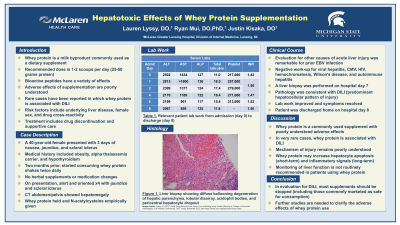Back


Poster Session D - Tuesday Morning
Category: Liver
D0582 - Hepatotoxic Effects of Whey Protein Supplementation
Tuesday, October 25, 2022
10:00 AM – 12:00 PM ET
Location: Crown Ballroom

Has Audio

Lauren Amanda Lyssy, DO
McLaren Greater Lansing
Presenting Author(s)
Lauren A. Lyssy, DO, Ryan Mui, DO, PhD, Justin Kisaka, DO
McLaren Greater Lansing, Lansing, MI
Introduction: Currently, more than 50% of Americans take dietary supplements. Whey is a commonly used protein supplement that is often viewed as safe, with only rare reports of drug-induced liver injury (DILI). Here, we report an unusual case of severe liver injury following whey protein consumption.
Case Description/Methods: A 40-year-old female with obesity and well-controlled hypothyroidism presented with 3 days of nausea and painless jaundice. Her only home medication was levothyroxine. Two months prior, she began drinking whey protein shakes (each containing 20 grams of protein) twice daily to aid with weight loss. She denied use of alcohol, recreational drugs, herbal supplements, and recent medication changes. On physical exam, she was alert and oriented x4, with jaundice and scleral icterus present. Lab work was significant for ALT 2,502, AST 1,434, total bilirubin 11.0, INR 1.42, and platelets 217,000. Acetaminophen and salicylate levels were unremarkable. Her whey protein supplementation was immediately stopped and a workup for transaminitis was initiated. RUQ ultrasound was unremarkable. Evaluation for other causes of acute liver injury, including viral hepatitis (A, B, C, E), EBV, CMV, HIV, hemochromatosis, Wilson’s disease, and autoimmune hepatitis was unremarkable. A liver biopsy was performed, with pathology showing diffuse ballooning degeneration of hepatic parenchyma, numerous acidophil bodies, and dominant pericentral hepatocyte drop-out. A diagnosis of DILI (with predominant hepatocellular injury) was made. Following discontinuation of whey protein supplementation, the patient’s labs and clinical symptoms improved, and she was discharged home on hospital day 8.
Discussion: This case highlights a rare occurrence of DILI secondary to whey protein consumption and emphasizes the importance of taking a thorough history when working up liver injury. Furthermore, in the treatment of DILI, we recommend cessation of all possible offending agents that were recently started, including supplements that are reputably marketed to be safe for consumption.
Disclosures:
Lauren A. Lyssy, DO, Ryan Mui, DO, PhD, Justin Kisaka, DO. D0582 - Hepatotoxic Effects of Whey Protein Supplementation, ACG 2022 Annual Scientific Meeting Abstracts. Charlotte, NC: American College of Gastroenterology.
McLaren Greater Lansing, Lansing, MI
Introduction: Currently, more than 50% of Americans take dietary supplements. Whey is a commonly used protein supplement that is often viewed as safe, with only rare reports of drug-induced liver injury (DILI). Here, we report an unusual case of severe liver injury following whey protein consumption.
Case Description/Methods: A 40-year-old female with obesity and well-controlled hypothyroidism presented with 3 days of nausea and painless jaundice. Her only home medication was levothyroxine. Two months prior, she began drinking whey protein shakes (each containing 20 grams of protein) twice daily to aid with weight loss. She denied use of alcohol, recreational drugs, herbal supplements, and recent medication changes. On physical exam, she was alert and oriented x4, with jaundice and scleral icterus present. Lab work was significant for ALT 2,502, AST 1,434, total bilirubin 11.0, INR 1.42, and platelets 217,000. Acetaminophen and salicylate levels were unremarkable. Her whey protein supplementation was immediately stopped and a workup for transaminitis was initiated. RUQ ultrasound was unremarkable. Evaluation for other causes of acute liver injury, including viral hepatitis (A, B, C, E), EBV, CMV, HIV, hemochromatosis, Wilson’s disease, and autoimmune hepatitis was unremarkable. A liver biopsy was performed, with pathology showing diffuse ballooning degeneration of hepatic parenchyma, numerous acidophil bodies, and dominant pericentral hepatocyte drop-out. A diagnosis of DILI (with predominant hepatocellular injury) was made. Following discontinuation of whey protein supplementation, the patient’s labs and clinical symptoms improved, and she was discharged home on hospital day 8.
Discussion: This case highlights a rare occurrence of DILI secondary to whey protein consumption and emphasizes the importance of taking a thorough history when working up liver injury. Furthermore, in the treatment of DILI, we recommend cessation of all possible offending agents that were recently started, including supplements that are reputably marketed to be safe for consumption.
Disclosures:
Lauren Lyssy indicated no relevant financial relationships.
Ryan Mui indicated no relevant financial relationships.
Justin Kisaka indicated no relevant financial relationships.
Lauren A. Lyssy, DO, Ryan Mui, DO, PhD, Justin Kisaka, DO. D0582 - Hepatotoxic Effects of Whey Protein Supplementation, ACG 2022 Annual Scientific Meeting Abstracts. Charlotte, NC: American College of Gastroenterology.

